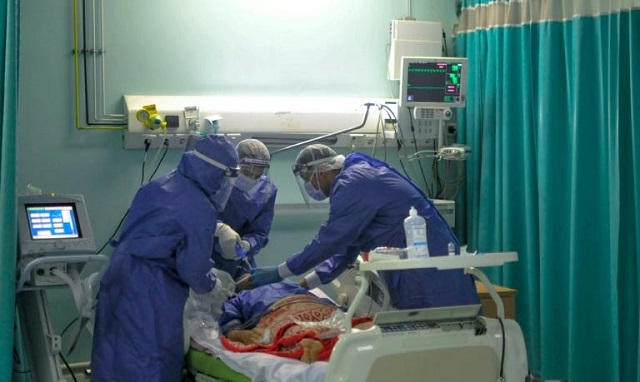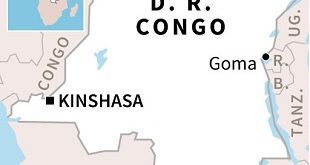
Cairo, Egypt | AFP | Three months after Egypt reported its first novel coronavirus case, medical experts warn the strained healthcare system of the Arab world’s most populous nation is nearing a “critical threshold”.
Hospitals have been hit by a flight of doctors abroad in recent years while the frontline staff left behind face shortages of medical supplies and protective gear that heightens the risk of infection.
The North African country of more than 100 million people has declared more than 13,000 cases and over 600 deaths from COVID-19 — and daily new infections are still on the rise.
The country’s 17 isolation hospitals reserved for novel coronavirus patients reached their maximum capacity at the start of the month, deputy health minister Ahmed al-Sobki told local press.
Since early May, the healthcare sector has indeed been approaching the “critical threshold of its capacity,” said Ayman Sabae, a health expert at the non-government Egyptian Initiative for Personal Rights.
In recent years, as Egypt was shaken by political turmoil, many medical professionals have moved overseas in search of better opportunities, leaving it with just one physician per 1,000 people, according to the doctor’s union.
As the virus caseload has mounted, the remaining healthcare workers have born the brunt of the crisis, often at very low pay.
“How can I build my life with a monthly salary of 1,800 Egyptian pounds (105 euros)? It’s impossible,” said Mohamed Ibrahim, a 26-year-old nurse at the Cairo Oncology Center.
To get by, Ibrahim works two jobs, also doing shifts in the private sector for a further 4,000 pounds (234 euros) per month.
– ‘Who will help us?’ –
The World Health Organisation says health care providers account for some 13 percent of total coronavirus infections in Egypt.
“We are terrified,” said Ibrahim, adding that at least 17 of his colleagues had tested positive for the illness. “Who will help us if we all get infected?”
Healthcare workers who show symptoms face difficulties getting tested, said Mona Mina, a member of the doctor’s union complaints committee.
She said they are often denied the so-called polymerase chain reaction (PCR) genetic tests and instead offered cheaper and less effective rapid diagnostic tests.
Another major concern, Mina said, has been a paucity of surgical masks which have been doled out only in driblets to healthcare providers — a shortfall partially offset by donations from non-government groups.
At the same time Cairo has sent tons of masks and other personal protective equipment to several foreign countries in what analysts see as a bid to burnish Egypt’s international image.
Many, including Mina, have criticised such aid initiatives as “incomprehensible”.
Egypt this year allocated 1.2 percent of its gross domestic product, or around 4.3 billion euros, to the health system — less than half of the three percent stipulated in the constitution, according to Sabae.
Nonetheless he believes the sector has shown a great “adaptive capacity” amid the crisis.
Authorities have opened dozens of test centres and are equipping some 35 hospitals to receive COVID-19 cases.
One million tests had been carried out by early May, of which 105,000 were PCR, according to Mohamed Awad Tageddine, health advisor to President Abdel Fattah al-Sissi.
Egypt, which was equipped with about 7,000 ventilators before the crisis, has also ordered new units, he said.
And Egypt’s military, which has recently begun producing face masks, might even set up makeshift hospitals as a last resort, according to the EIPR group.
– Curve yet to peak –
Despite the desperate situation in the hospitals, Egypt has gradually eased confinement measures to revive the battered economy.
The government had since late March imposed a night-time curfew, halted air traffic, shuttered religious sites and closed schools and universities.
But it eased the restrictions in recent weeks, hearted by what is considered a relatively low infection rate in the youthful country where 60 percent of people are below 30.
Yet some experts fear the worst is still to come. While the number of daily deaths has remained relatively stable, daily new infections hit a record of 720 cases on Tuesday.
The doctors’ union in early May urged the government to impose a total lockdown during the Islamic holy fasting month of Ramadan.
Prime Minister Mostafa Madbouli dismissed that option but on Sunday urged people to adhere to measures like wearing face masks as Egypt moves to relax restrictions.
Mina said in a Facebook post that “when the government shrinks curfew hours, it is basically telling people to do what they want … It is a shame to then blame it on a lack of awareness”.
Sabae warned that the “authorities really need to change their approach because Egypt has yet to reach the peak of the curve”.
 The Independent Uganda: You get the Truth we Pay the Price
The Independent Uganda: You get the Truth we Pay the Price


